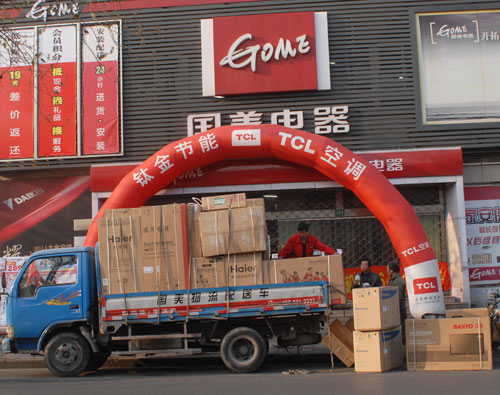Home appliance sales cool off
Updated: 2012-01-30 09:40
By Yu Ran (China Daily)
|
|||||||||
But some experts predict downturn is temporary and recovery is around the corner, as soon as fourth quarter
SHANGHAI - The expiry of the home appliance replacement program at the end of 2011 did as was expected and cooled down the electrical equipment market.
According to the statistics provided by Wenzhou Home Appliance Association, the sales of home appliances in the city for the first two weeks of 2012 declined at least 30 percent compared with the same period last year.
"The home appliance program obviously attracted many customers to buy new electrical appliances to replace their old ones in the past year despite the slump in the property market," said Guan Shaoxiong, president of Wenzhou Home Appliance Association.
Guan added that the decline in demand would probably continue until the third quarter of this year and hopefully will recover gradually along with the improving economic environment of the country.
In order to help retailers, the association will encourage stores to hold sales with considerable discounts to attract customers.
"We will try to help home appliance retailers escape the tough period after the Chinese New Year with organizing more events to attract residents from urban and rural areas," said Guan.
Wang Zhe, deputy executive officer of sales at domestic electrical appliance retailer Suning, said: "We're looking forward to seeing more customers coming to purchase products in our stores with the increase in the number of newly weds and demand from people moving to new apartments."
The Year of the Dragon is considered by many to be auspicious for marriages.
Wang added that the subsidized home appliance purchase program in rural areas will not expire until 2013 so more custom from the countryside and second- or third-tier cities could be expected.
Midea, a Shenzhen-based household appliance manufacturer, aims to upgrade its products in the hope that higher quality and more innovative elements will increase sales.
"We're ready to enter a period of upgrading the structure of the company and manufacturing more low-carbon products with higher efficiency to meet demand from the market," an announcement from Midea stated.
Midea plans to finish the upgrade process of its most modern air conditioner in two years.
The home appliance replacement program was designed to spur domestic consumption and curb pollution. It was launched in June 2009 and lifted the sales volume of home appliances for the past year to more than 342 billion yuan ($54 billion), according to the latest statistics released by the Ministry of Industry and Information Technology at the end of 2011.
|
 |
|
Workers loading a truck with home electrical appliances in front of a Gome Group store in Shanghai. Despite the end of Chinese government subsidies on home appliances, Gome, Suning and other major electrical appliance stores offered big discounts to boost sales during the Spring Festival holiday. [Photo/China Daily] |
The Ministry of Commerce announced on its website on Dec 23 that the program would end on Dec 31, after two years.
People in nine provinces and cities including Guangdong, Beijing and Shanghai received a subsidy worth 10 percent of the retail price on five kinds of new appliances: TV sets, refrigerators, washing machines, air conditioners and computers.
"The decline in demand for home appliances that occurred after the expiry of the program was also as a result of the effect of the worsening world economy on China's economic environment," said Luo Qingqi of Pully Brand Technology Consulting Company.
Luo said the program had successfully expanded the domestic market for home appliances. This showed that China has the ability to balance demand with customer spending perfectly.
"Although the home appliance market will decline temporarily, the recovery will arrive very soon, when China's economic growth increases," he added.
Sales for electrical appliances may drop by as much as 10 percent this year, Capital Securities Corp analyst James Hu was quoted by a Bloomberg report as saying.
The slowdown is boosting competition in China's $77 billion appliance market as local brands that traditionally made cheaper products use premium lines to bolster profits, Bloomberg report said.
Manufacturers are marketing swankier offerings, including Qingdao Haier Co's 13,999 yuan red washing machine, to attract China's increasingly affluent consumers.
That may help them draw local shoppers, and eventually global ones, from overseas competitors such as Philips and Siemens AG (SIE), Bloomberg reported.
"Some domestic brands have shown a strong ability to develop new, better products," said Chen Jun, a Beijing-based analyst at Boxin Capital. "It's a perfect time to upgrade, as they've made a lot of money from the favorable policies and aren't worried too much about cash."
"Many Chinese consumers who have higher purchasing power used to prefer foreign brands because they think they've got reliable quality," said Chen. "Things have changed recently. Some domestic brands have shown strong ability to develop new products."
China's appliance industry is expected to grow to 862.3 billion yuan in 2016 from 485.8 billion yuan in 2011, according to estimates by London-based researcher Euromonitor International.
The business environment for the appliance industry "isn't very promising" this year, said Zhang Tieyan, a spokeswoman for Haier Group. The closely held appliance maker, the biggest shareholder of Qingdao Haier, will focus on innovation and push for market share through premium products such as frost-free, three-door refrigerators, she said.
Local brands may have an edge. "Foreign brands will find it hard to compete with domestic brands, especially in central and western areas, because they don't enjoy advantages on costs or distribution network," said Wang.
The Chinese government is studying policies to encourage spending on energy-saving products, online shopping and tourism, Minister of Commerce Chen Deming said Jan 5.
China could introduce new policies that favor only certain appliance categories, such as energy-saving products, later this year, experts said.
Bloomberg contributed to this story








